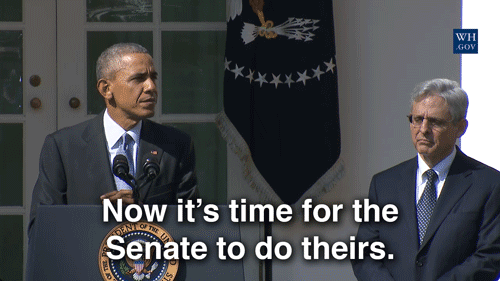
Yesterday, President Obama nominated Merrick Garland to replace Justice Antonin Scalia on the Supreme Court. How he might rule on issues of interest to the tech community is unknown, but by all accounts, a Justice Garland would bring intelligence and thoughtful jurisprudence to the bench. The Court is too critical to our nation’s work to let a seat stand vacant for more than a year. Judge Garland deserves an up or down vote from the Senate.
Judge Garland’s credentials are impeccable and moderate. He has been on the U.S. Court of Appeals for the District of Columbia Circuit since 1997, and currently serves the Chief Judge for the court. His work has drawn praise from Democratic and Republican Senators alike. He previously served in the Justice Department under President Bill Clinton, and was a law clerk to Justice William Brennan (who was appointed by Republican President Dwight Eisenhower), as well as to Second Circuit Court of Appeals Judge Henry Friendly, for whom Chief Justice John Roberts also clerked. Judge Garland also worked as a prosecutor and as a lawyer in private practice with the Arnold & Porter firm.
In the years ahead, the Supreme Court will hear cases of great importance to our digital futures, including setting the limits of government surveillance, determining whether consumers have privacy rights for their data, and applying First Amendment protections to the digital age. Judge Garland’s background does not demonstrate a clear ideological tilt in many of these issues, but a review of his record suggests that he would bring a reasoned application of established case law to the Court.
For a long-tenured judge on a prominent court of appeals, Judge Garland has participated in surprisingly few cases that resulted in Supreme Court review. One arose in the early challenges to Guantanamo, where his panel held that federal district courts lacked habeas corpus jurisdiction over the Guantanamo detainees’ claims. This decision was subsequently reversed by the Supreme Court in a six-to-three ruling. That said, it is difficult to infer too much from Judge Garland’s vote in the case at the lower level: there is an argument that the DC Circuit’s opinion was compelled by prior Supreme Court precedent. Indeed, in a later case in 2008, Judge Garland ruled in favor of a detainee held at the U.S. naval base at Guantanamo Bay, Cuba, where Judge Garland found that a U.S. tribunal was wrong in determining that detainee Huzaifa Parhat, an ethnic Uighur from China, was an “enemy combatant.”
Judge Garland has made important technology rulings, particularly in response to FOIA requests. In 2013, he wrote an important decision ordering the CIA to release information about drone strikes to a federal judge. In 2011, he recognized the importance behind a FOIA request looking for information about the government’s warrantless-tracking of cell phones.
But on Fourth and Fifth Amendment jurisprudence more broadly, Judge Garland has more frequently sided with law enforcement over the accused – an area where he may break with some of Justice Scalia’s jurisprudence. Judge Garland generally heeds military or intelligence experts, as when he raised sharp questions in 2013 about a lawsuit seeking photographs depicting terrorist Osama bin Laden after his death. In a similar vein, in 2014, he upheld genital searches of Guantánamo Bay detainees prior to their meetings with defense attorneys.
Judge Garland has tended to take a broader view of First Amendment rights. For example, he has ruled in favor of public employees claiming they were fired as a result of First Amendment activities. Similarly, he dissented in a high-profile case involving members of Congress, when a third party passed an illegally obtained communication to the press and the court was charged with deciding the question of whether privacy concerns should trump freedom of speech rights.
There is no crystal ball allowing us to determine how a Supreme Court justice will rule on a particular case. Indeed, to the horror of the President who nominated them, many justices evolve on the Court and their decisions take dramatic shifts. But Judge Garland has spent his career thoughtfully applying precedent, and his rulings at the Court cannot be predetermined.
On a personal note, I have briefly met Judge Garland on a number of occasions. In my experience, he treats everyone in his presence, from wait staff to other judges, with courtesy and grace. Americans deserve a fully-functioning Supreme Court. The Senate should afford Judge Garland the same professional courtesy with which he has treated others throughout his professional life, and provide him with an up or down vote.
[“source -livemint”]



